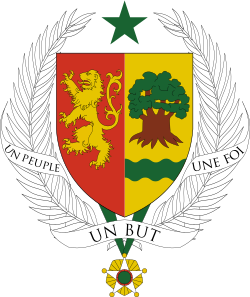| |||||||||||||||||||
Presidential election | |||||||||||||||||||
| Turnout | 58.77% | ||||||||||||||||||
|---|---|---|---|---|---|---|---|---|---|---|---|---|---|---|---|---|---|---|---|
| |||||||||||||||||||
| |||||||||||||||||||
| Turnout | 57.87% | ||||||||||||||||||
This lists parties that won seats. See the complete results below. | |||||||||||||||||||
 |
|---|
General elections were held in Senegal on 28 February 1988 to elect a president and National Assembly. Incumbent president Abdou Diouf defeated three other candidates in the presidential election, whilst in the National Assembly election Diouf's Socialist Party won 103 of the 120 seats. [1] Voter turnout was 58% in the Assembly election and 59% in the presidential election.
Contents
Public disorder broke out during the election. [2] [3] President Diouf declared a state of emergency amid riots. [3] Supporters of Wade made accusations that the election was fraudulent. [3] Wade described the results as "ridiculous." [3]

